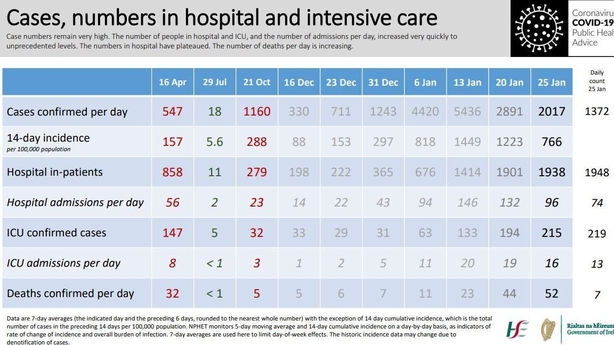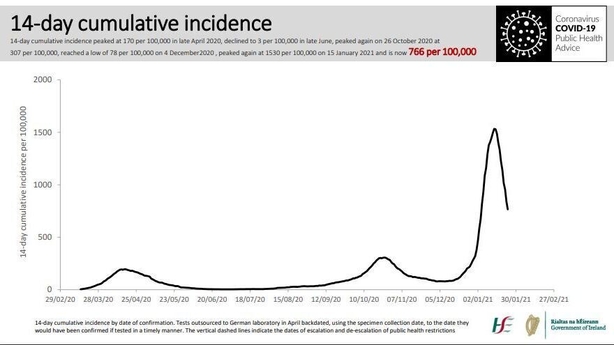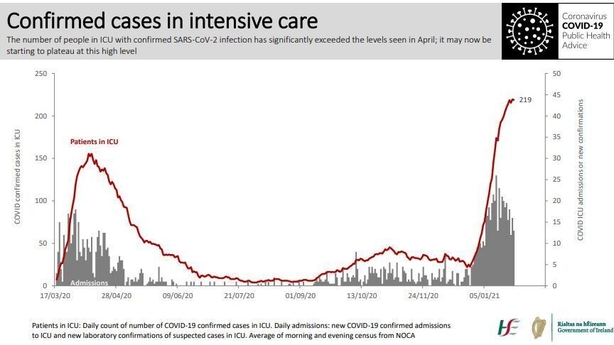The Department of Health has reported seven more coronavirus-related deaths.
There have been 688 deaths so far in January associated with Covid-19 and 2,977 since the beginning of the pandemic.
The median age of those who died is 77 and the age range is 43-94 years.
A further 1,372 new cases of Covid-19 have also been reported, bringing the total number of cases here to 188,923.
There are 219 people in intensive care with Covid-19, up one on yesterday.
The Chair of the National Public Health Emergency Team's Epidemiological Modelling Advisory Group said there has been a "continued rapid improvement" in the incidence of the disease.
Speaking at a NPHET briefing, Professor Philip Nolan said the number of people in hospital had peaked and plateaued and should begin to decline over the coming week, but warned that "we expect those numbers to remain high for many weeks to come".
He said the number of admissions to hospital has decreased, with an average of below 100 over past seven days, but the number of people in ICU is a third more than the peak of the first wave in March and April.

Prof Nolan said they had seen the highest average number of deaths per day - 52 - in the past week than at any time during the pandemic.
Read more:
Latest coronavirus stories
Five key points from the Covid-19 briefing
He said the 14-day incidence rate continued to decline and is now 766.2 per 100,000 population.
Co Monaghan has the highest incidence rate at 1,485.7 per 100,000 and Co Leitrim has the lowest at 271.5 per 100,000.
He said the situation where the incidence rate was higher in younger people and lower in older people has reversed and they remain worried about the incidence rate of the disease in those aged 65 and older.
Prof Nolan said people needed to continue to keep their contacts low, but NPHET can clearly see the efforts that people are making to stay apart, which is contributing to a decrease in daily case numbers.
He also said there was no evidence of increased mortality from the variant that originated in England.
Deputy Chief Medical Officer Dr Ronan Glynn said there was no evidence of cases here of the variant of Covid-19 identified in Brazil.
There is no evidence that the variant that originated in Brazil is in Ireland. Testing is ongoing, says Dr Ronan Glynn. | Read more: https://t.co/yW9N08ihLJ pic.twitter.com/DGnKyNG2tz
— RTÉ News (@rtenews) January 25, 2021
When asked about mandatory quarantine for people coming into the country, Dr Glynn said any measure that reduced someone who is infected or infectious coming into the country is welcome.
He said NPHET has seen reasonably significant levels of travel into the country but they are a shadow of pre-pandemic activity.
In relation to schools, Dr Glynn said they would not speculate on what level the disease needs to be at in order for schools to reopen.
Deputy CMO Dr Ronan Glynn says he can't see the movement of a million people - as would be happening if schools reopened - happening in the next fortnight. | Read more: https://t.co/yW9N08ihLJ pic.twitter.com/vZP1qibFM5
— RTÉ News (@rtenews) January 25, 2021
He said the reduction in mobility of people around the country had led directly to a reduction in close contacts.
Dr Glynn said that while the data presented by Prof Nolan was promising, the level of disease is "way higher than where we want to be or need to be" and now is not the time to see the mobility of one million people.
When asked about EU countries recommending surgical masks Dr Glynn said they are looking at what Austria has introduced.
He said "in the first instance we are keen that any change regarding masks would ensure that supply is sufficient for people in healthcare settings".

He said not to get overly concerned about the type of mask, it was about wearing a mask appropriately.
In relation to close contacts, Professor Nolan said: "We are monitoring the number of close contacts very closely. The number per case has been below 2.5 since the beginning of January, we can see the efforts people are making to stay apart.
"This is leading to a change in the behaviour of the disease, it was growing at 18% per day in the run-up to January and is now decreasing by 8% to 10% per day."
Dr Glynn said there have been reports of significant outbreaks associated with funerals. "It is a particularly sensitive area and difficult time for people but the last thing we want is for people to get sick and die."
There have been repeated reports of large outbreaks associated with family gatherings and funerals in particular, says Dr Ronan Glynn. | Read more: https://t.co/yW9N08ihLJ pic.twitter.com/ZDTNH0UMfl
— RTÉ News (@rtenews) January 25, 2021
When asked about the vaccine he said there was not too much he could say on the delay in vaccine supply.
"The high level task force [for vaccines] met today and it is clear that the vast majority of the supply to this country has been given out. Hopefully it won't impact too much."
Virus hitting communities hard - GP
Meanwhile, a Waterford-based GP told the NPHET briefing that the third wave of the disease had hit his community hard with up to one in 20 people affected by Covid-19.
Dr Dermot Nolan highlighted two recent cases: "We treated a family where all the members tested positive.
"During the isolation period, a 10-year-old boy developed acute appendicitis. His parents were not permitted access to the hospital with him so he had to go in and face the operation alone.
"He was very brave and made a full recovery, but I want to ask all parents to consider how they would feel in this situation?"
He said another patient, a woman who presented with new onset heart failure, refused to get treatment in hospital because she was so terrified of contracting Covid-19.
"She opted not to go and this ultimately put her life at risk."
Dr Nolan said he was still treating "young, fit patients who contracted Covid-19 several weeks ago and still have extreme lethargy and breathing problems".

In Northern Ireland, 17 further deaths of people with Covid-19 have been recorded, 12 occurring during the past 24 hours.
It takes the official death toll there to 1,747. There are 828 confirmed coronavirus patients in hospital, with 74 in ICU - 50 of whom are on ventilators.
Latest figures reveal 182,355 vaccines have been administered in the North, of which 159,642 were first doses and 22,732 were second doses.
Slaney Foods in Bunclody said this evening it is operating at a "significantly reduced capacity" as a result of the outbreak.
"In line with Covid-19 protocols, all close contacts of those impacted are currently self-isolating," the company said in a statement.
The cases were detected following testing of staff last Friday.
